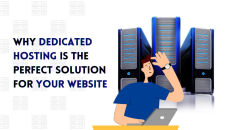In today’s digital era, having a strong online presence is crucial for businesses and individuals alike. A website serves as a virtual storefront, representing your brand and showcasing your products or services to a global audience.
However, with the increasing demands of online users and growing competition, it’s essential to have a website that is optimized for performance, reliability, and security. One way to achieve this is by leveraging the power of dedicated servers.
In this deep dive, we will explore the benefits of using dedicated servers for your website and how they can help you unleash its full potential.
Table of Contents
- What is a dedicated server?
- Performance and reliability
- Scalability
- Customization and control
- Security
- Cost-effectiveness
- How to choose a dedicated server?
- Conclusion
What is a Dedicated Server?
A dedicated server is a type of web hosting where an entire physical server is exclusively allocated to a single website or application. In other words, you have full control over the server resources, and you don’t share them with any other websites or users. Unlike shared hosting, where multiple websites share the same server resources, dedicated servers provide unparalleled performance, scalability, and security.
Performance and Reliability
One of the primary advantages of using a dedicated server for your website is the superior performance and reliability it offers. When you have a dedicated server, all of its resources, including CPU, RAM, storage, and bandwidth, are solely dedicated to your website. This means that your website will load faster, handle more concurrent users, and deliver a seamless user experience, even during peak traffic periods.
Dedicated servers also provide higher uptime compared to shared hosting. In shared hosting, if one website on the same server experiences a sudden surge in traffic or encounters a technical issue, it can affect the performance and availability of other websites sharing the same resources. However, with a dedicated server, you have complete control over the server environment, which reduces the risk of downtime and ensures that your website remains accessible to users at all times.
Scalability
Another significant advantage of dedicated servers is scalability. As your website grows and attracts more traffic, you need to have the ability to scale your resources to meet the increasing demands. Dedicated servers allow you to easily upgrade or expand your server resources, such as adding more CPU cores, RAM, or storage, to accommodate your website’s growing needs. This flexibility enables your website to handle high traffic loads, deliver faster response times, and provide a seamless user experience, even as your business grows.
Customization and Control
With a dedicated server, you have full customization and control over your server environment. You can configure your server settings, install any software or applications of your choice, and optimize the server for your specific requirements. This level of control allows you to tailor your server resources and settings to meet the unique needs of your website or application. Additionally, you have the freedom to implement advanced security measures, such as firewalls, intrusion detection systems, and SSL certificates, to protect your website from potential security threats.
Security
Website security is a top priority for any online business or individual. Dedicated servers provide a high level of security compared to shared hosting. When you have a dedicated server, you don’t share your server resources with other websites, which reduces the risk of security breaches and data leaks that can occur in a shared hosting environment.
You have full control over your server’s security settings, and you can implement robust security measures to protect your website and user data from potential cyber threats.
Furthermore, dedicated servers offer enhanced data privacy. In a shared hosting environment, your website’s data may reside on the same server as other websites, which can potentially expose your data to other users. However, with a dedicated server, your website’s data is isolated and not accessible by other websites or users, providing an additional layer of data privacy and security.
Cost-Effectiveness
While dedicated servers offer numerous benefits, it’s important to acknowledge that they may come with a higher price tag compared to shared hosting. However, when considering the total cost of ownership, dedicated servers can be cost-effective in the long run.
One of the main reasons is that dedicated servers allow you to have full control over your server resources. You can optimize your server settings, utilize the resources efficiently, and avoid resource wastage. In a shared hosting environment, you may be limited by the server resources allocated to you, which can result in performance issues and additional costs for resource upgrades.
Additionally, with a dedicated server, you don’t have to worry about unexpected surges in traffic or resource limitations caused by other websites sharing the same server. This means that you won’t have to invest in additional resources or upgrades to handle traffic spikes, as you have the flexibility to scale your resources as needed. This can save you money in the long run, compared to shared hosting where you may have to pay for additional resources or face performance issues during peak traffic periods.
How to Choose a Dedicated Server?
Choosing the right dedicated server for your website is crucial to ensure optimal performance, reliability, and security. Here are some key factors to consider when selecting a dedicated server:
- Server Specifications: Consider the server specifications, including CPU, RAM, storage, and bandwidth, to ensure that they meet the requirements of your website or application. Consider the current and future needs of your website to ensure scalability.
- Operating System: Choose the operating system that best suits your website’s requirements and the applications you plan to run on the server. Popular options include Linux-based systems, such as CentOS, Ubuntu, and Debian, and Windows-based systems.
- Server Management: Decide whether you want to manage the server yourself or opt for managed hosting, where the hosting provider takes care of server maintenance, updates, and security. Managed hosting can be beneficial if you don’t have the technical expertise or the resources to manage the server yourself.
- Data Center Location: Consider the location of the data center where the dedicated server is hosted. Choose a data center that is geographically close to your target audience to minimize latency and improve website performance.
- Security Features: Look for dedicated servers that offer robust security features, such as firewalls, intrusion detection systems, SSL certificates, and regular backups, to protect your website and user data from potential cyber threats.
- Support and SLA: Consider the level of support provided by the hosting provider, including technical support, response time, and service level agreement (SLA). Choose a hosting provider that offers reliable support and guarantees a high level of server uptime.
Conclusion
In conclusion, dedicated servers offer a wide range of benefits that can help you unleash your website’s full potential. From superior performance and reliability to scalability, customization, and enhanced security, dedicated servers provide a robust hosting solution for websites and applications with high traffic loads or specific requirements.
While they may come with a higher price tag compared to shared hosting, dedicated servers can be cost-effective in the long run, considering the total cost of ownership and the benefits they offer. When choosing a dedicated server, consider factors such as server specifications, operating system, server management, data center location, security features, and support to ensure that you select the right hosting solution for your website.
With a dedicated server, you can optimize your website’s performance, security, and user experience, and unlock its full potential in the competitive online landscape.










Add comment